Covid: Oxford-AstraZeneca vaccine rollout begins in Wales
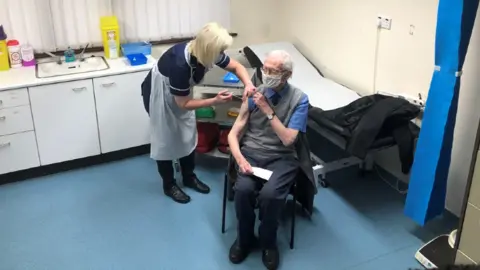 BBC
BBCIt has been described as a "momentous day" in the fight against Covid-19 as the rollout of the second Covid vaccine begins in Wales.
Health Minister Vaughan Gething said the start of the Oxford-AstraZeneca vaccine programme was "a key milestone" in the fight against Covid.
The Welsh Government said 40,000 doses will be available within the first two weeks - with 22,000 jabs this week.
More than 35,000 people in Wales have had a Pfizer-BioNTech vaccine dose.
The number of mass vaccination centres in Wales will be increased to 22 and more than 60 GP surgeries will offer the Oxford vaccine - mobile units will also be set up throughout Wales.
'I'm very privileged to have it'
One of the first people to receive the vaccine on Monday was Ralph Evans, 88, who was vaccinated at the Pontcae medical practice in Merthyr Tydfil.
He was one of eight people there to receive the Oxford-AstraZeneca vaccine. Mr Evans said he was "very grateful" to be getting it.
He was followed by 86-year-old Derek Games, former mayor of Merthyr, who said: "I'm delighted, I'm very privileged to have it."
The medical centre hopes to vaccinate 1,000 people by the end of January after being contacted on New Year's Eve about starting vaccinations.
"We received a hundred vaccines at lunchtime today," practice manager Kevin Rogers said. "We hope to get through the hundred this week."
Mr Rogers said they would be asking staff to work additional hours on weekends to help reach the target of 1,000 people over the coming weeks.
The Welsh Government's priority is to vaccinate front-line health and social care staff, care home residents and staff, and people over 80.
Plaid Cymru said "serious questions" remained about the roll-out plans, while a professor in palliative medicine said she was concerned "at the very slow apparent roll out" for those aged over 85.
Mari Lloyd Williams, from the University of Liverpool, said "huge numbers have self-shielded since March".
"Apart from intense loneliness this leads to loss of confidence and reduction in both physical and mental and cognitive well-being, meaning that some may need to enter full time care sooner," she said.
"We need to be vaccinating 24/7 in order to get this under control and to protect our most vulnerable."
The Pfizer vaccine has to be kept at -70C, but the Oxford jab can be stored at standard fridge temperatures so can be administered in doctors surgeries, pharmacies and care homes.
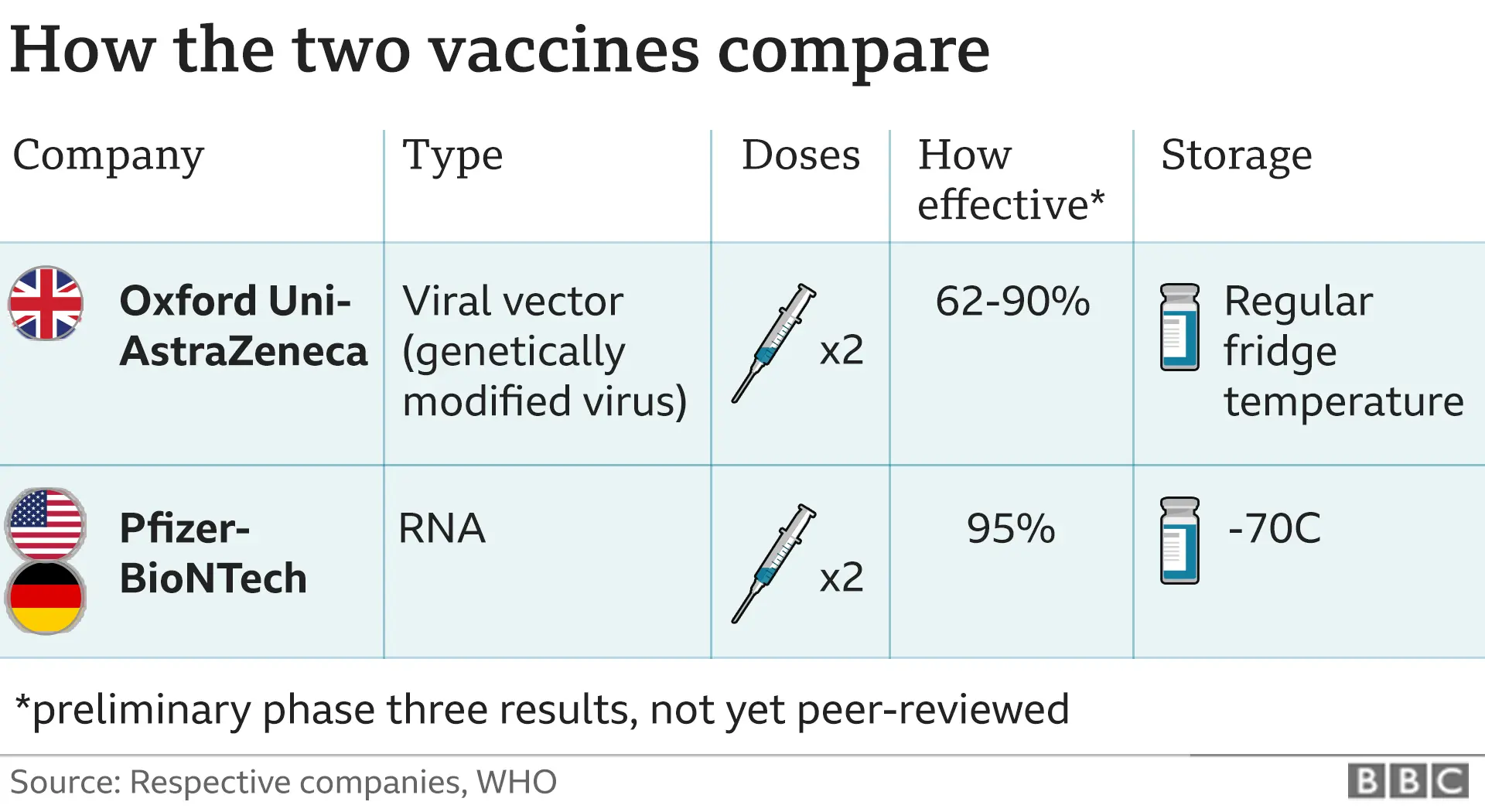

Dialysis patient Brian Pinker, 82, was the first person to receive the Oxford-AstraZeneca Covid-19 vaccine in Oxford.
"It is an absolutely momentous day," said Dr Gillian Richardson, who is leading the Covid vaccination programme in Wales.
"The vaccine has been prioritised for those groups where it has been harder to reach with the Pfizer vaccine - so we're prioritising the over 80s and care home staff and residents."
Ms Richardson said the pace of the rollout "will be governed by supply" and "will start slowly this week but build vastly over the coming weeks and months."
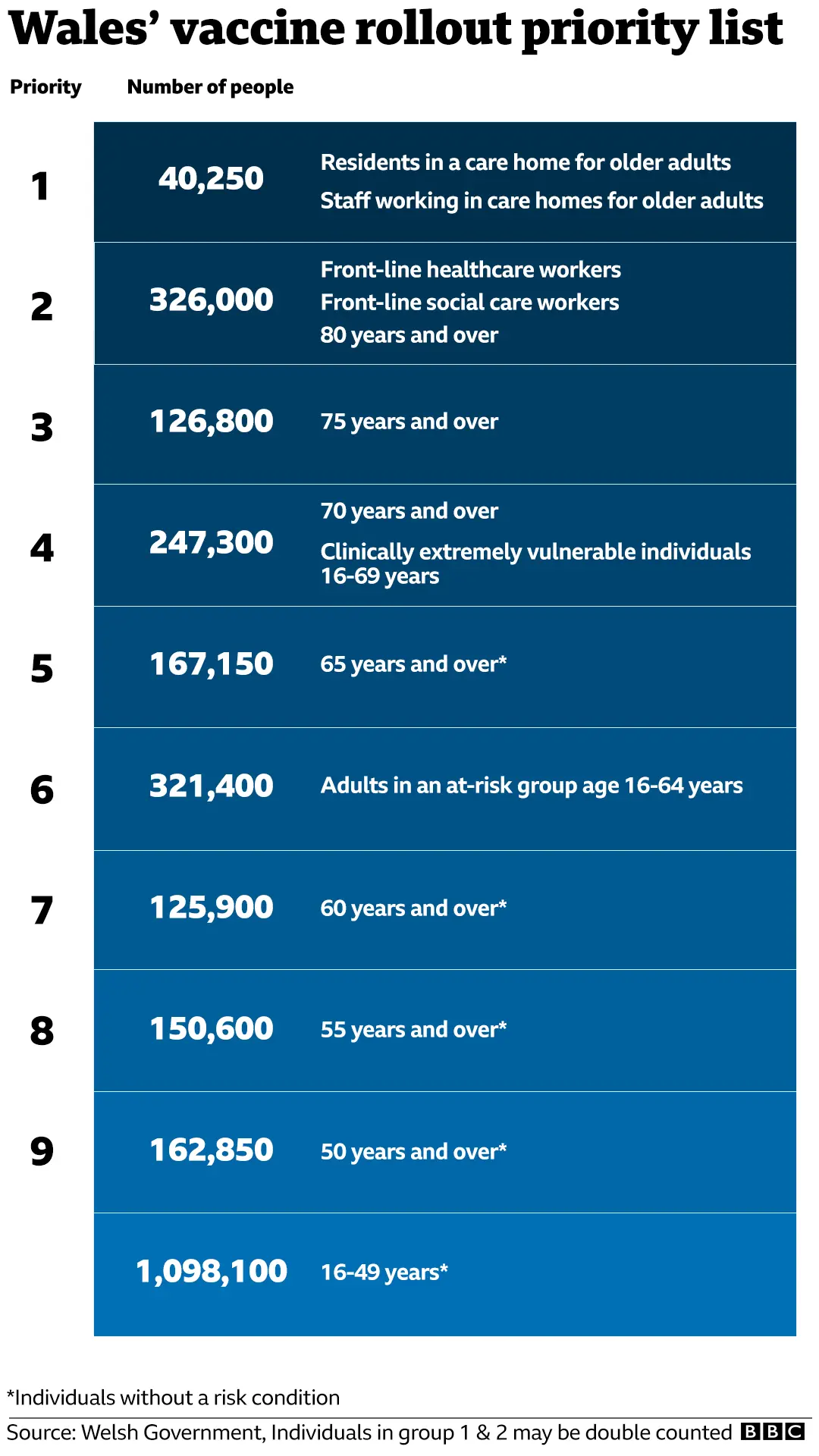

Both vaccines require two doses to be administered with an interval of between four and 12 weeks - a change from the previous advice of four weeks between jabs.
The change has been "very controversial", according to one GP who will administer the Oxford vaccine, but she agrees with the decision.
"The evidence suggests that a longer time period between first dose and second booster gives you better immunity," said Dr Rowena Christmas, a Monmouthshire GP whose surgery is part of the rollout pilot.
"The key thing is we need to protect people. If we gave 1,000 second doses of the Pfizer vaccine next week then that's 1,000 people who won't get the first protection.
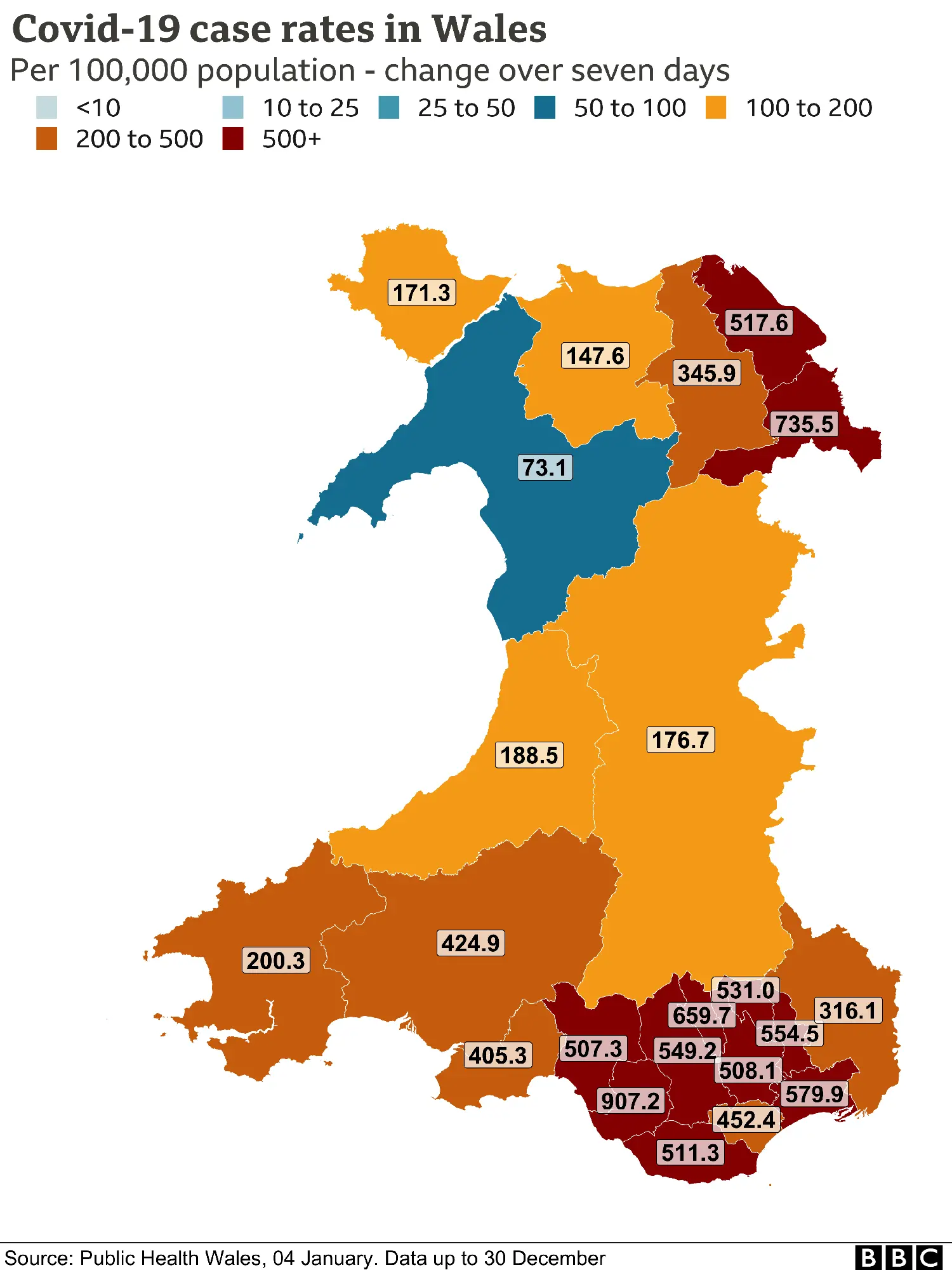

"As soon as you have the first dose of the Pfizer vaccine, within about 10 days you've got 70% protection from coronavirus.
"But if you are in the 30% that does catch it, you're much less likely to get severely ill and much less likely to go to hospital.
"We are in a crisis situation and we have to protect as many people as we possibly can."
Wales is under "stay at home" lockdown restrictions after a rise in Covid-19 cases - with more than 31,000 cases in Wales in the two weeks over the Christmas period.
There are almost 2,700 people with coronavirus symptoms in Welsh hospitals - with "more than half" of the 208 critical care patients having Covid.
But Mr Gething said Wales' overall Covid incidence rate had fallen from a high of 636 cases per 100,000 people before the lockdown started to 446 cases on Monday.
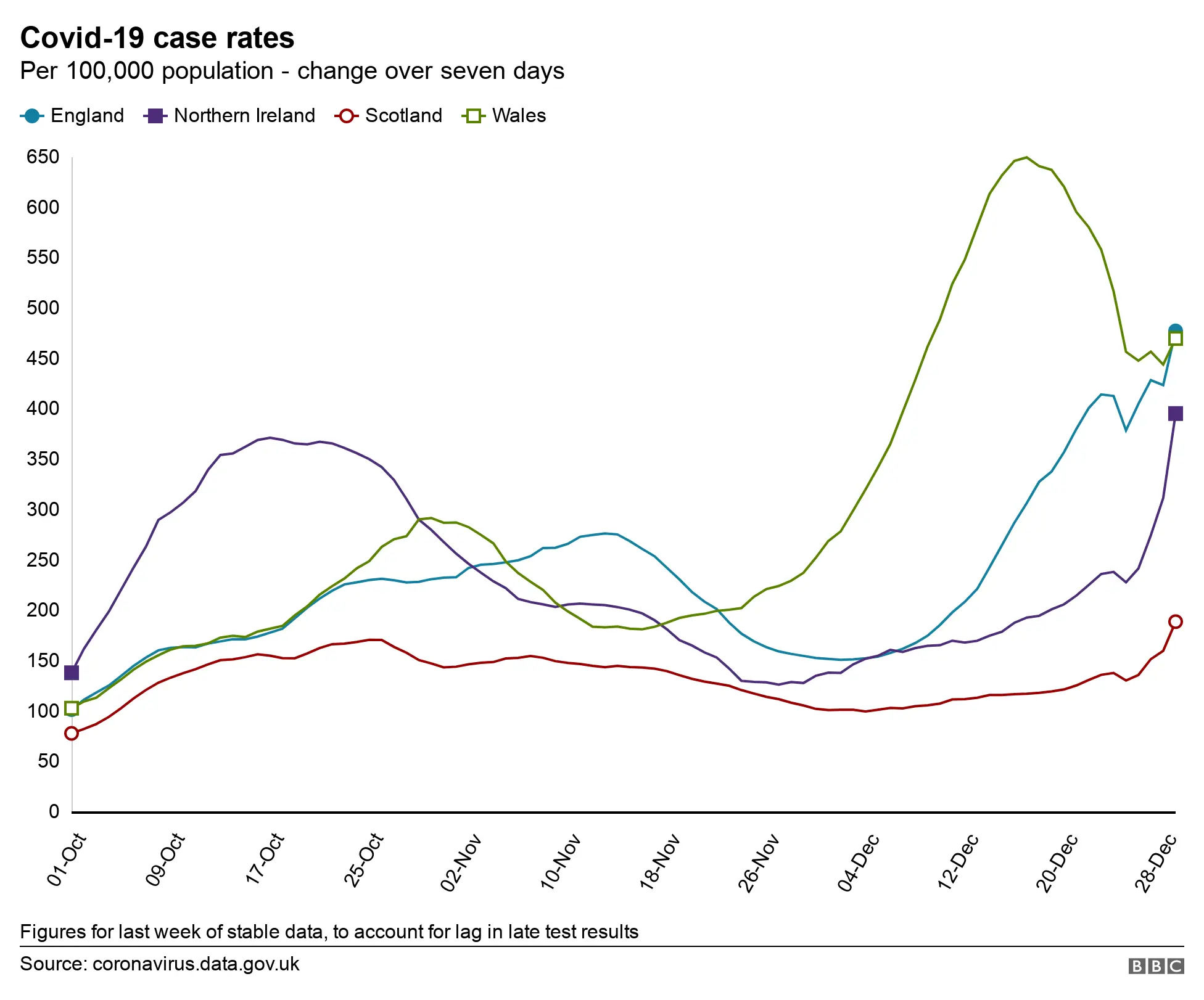
Wales had the highest Covid case rate in the UK before Christmas with nine out of the top 10 of the UK's most infected counties in Wales.
Latest available data shows England's Covid case rate has risen above Wales for the first time in about a month - with Gwynedd having the lowest infection rate in the UK.
"Cases of the virus remain very high" although rates had fallen back from the incredibly high levels from just before Christmas," said Mr Gething.
The British Medical Association in Wales said there was concern among staff that a 12-week gap between doses could lead to "sacrificing some immunity" because trials had involved a shorter gap.


But First Minister Mark Drakeford said the longer time between doses and the rollout of a second jab would see the pace of vaccinations increase.
"By the end of the month we will be doing in a day what we've been able to do in a week prior to Christmas, maybe more than that," he said.
Unlike the Pfizer-BioNTech vaccine, the Oxford-AstraZeneca vaccine is stored at normal vaccine fridge temperatures so will have fewer storage and transport issues, making it much easier to use in care homes and GP surgeries.
"This is a game changer in the fight against Covid, it's absolutely huge," Dr Christmas, principal GP at the Wye Valley Practice, told BBC Radio Wales.
"We need this vaccine because it's easy to give. We can now all get involved and start this rollout of this crucial vaccination programme."
The Welsh Government said every health board in Wales will receive its allocation in proportion to the size of its priority population and ability to deliver.

But it warned the effects of the vaccines may not be seen nationally for many months and the advice remained to keep contacts with others to a minimum, keep a two-metre distance from others, wash hands regularly, wear a face covering where required and avoid touching surfaces others have touched.
People have also been asked not to phone their GP, pharmacy or hospital to ask when they will get a vaccine and wait for a letter which "will provide people with a measure of assurance" and will explain how they will be contacted.
Mr Gething said: "Today marks a key milestone in our fight against the Covid-19 pandemic.
"Its approval will help us to speed up our vaccination programme and run more clinics closer to people's homes".
While Plaid Cymru are "pleased" with the second vaccine rollout, health spokesman Rhun ap Iorwerth said: "Wales has been behind every other UK nation in terms of numbers vaccinated and there's far too much variation from region to region - Welsh Government must not allow a postcode lottery."
The Welsh Conservatives previously criticised the speed of the first vaccine rollout, saying hope had "dropped away" for many over 80 who were "desperately waiting for their appointment".

The rollout of the new vaccine will be another injection of hope at a time when it's so desperately needed.
At least 22,000 doses will be available in Wales this week followed at least another 20,000 next week.
The hope is then to ramp up its distribution as supplies arrive, so that around 1.5 million people in Wales at greatest risk of getting really ill from Covid, for example older people or those who have long term health conditions, can get a jab within the next few months.
Because it can be stored for much longer in a normal fridge, the Oxford-AstraZeneca vaccine is easier to deliver in places like GP surgeries and care homes than the other Pfizer/BioNTech vaccine.
Getting both vaccines out is now a race against time.
